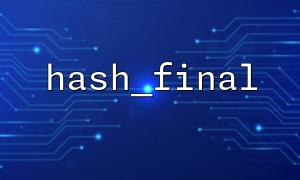In PHP, the hash function provides the ability to generate data digests and is often used in areas such as data verification and password storage. The hash extension of PHP provides several commonly used hash functions, such as hash_init , hash_update , and hash_final . Although these functions can help us generate hash values, how to correctly manage hash state is a problem that needs attention during actual use. This article will focus on analyzing the state management problems of hash_final and hash_update in use, and provide some solutions.
Before starting to analyze state management, let’s first understand the basic use of these functions.
hash_init : This function is used to initialize a hash context. It receives two parameters, the first is the algorithm name (such as sha256 , md5 ), and the second is whether to return an updating context.
hash_update : This function is used to add data to the initialized hash context. When performing hash calculations, there is no need to re-initialize every time, just update through hash_update .
hash_final : This function returns the final hash value and destroys the hash context. When performing this operation, it usually means that the hash calculation has been completed and the returned hash value is a summary of the input data.
In the process of using hash_update and hash_final , we tend to ignore the state management of the hash context. Here are a few common questions:
If hash_final is called before hash_update is called, subsequent hash_update will not be able to continue updating the same hash context. Because hash_final will destroy the current hash context and return the final hash value.
$context = hash_init('sha256');
hash_final($context); // Destroy the context
hash_update($context, 'data'); // mistake:Cannot update destroyed context
To avoid this error, you should make sure that hash_final is called only after the data has been completely added.
If hash_final is called multiple times, a different hash value will be returned each time and the original context will be destroyed. Usually we don't want the context to be destroyed every call, but rather we want the entire hash calculation to be done in one context. Therefore, it is best to ensure that hash_final is only called once per time and only after the hash calculation is completed.
$context = hash_init('sha256');
hash_update($context, 'data1');
$final1 = hash_final($context);
hash_update($context, 'data2'); // mistake:The context has been destroyed
When using the same hash context in multiple places, it can cause state sharing issues. For example, if a function is updating a hash context and another function is also updating with the same context, a conflict will occur.
$context = hash_init('sha256');
hash_update($context, 'data1');
function updateContext($context) {
hash_update($context, 'data2');
}
updateContext($context);
$final = hash_final($context); // Included data1 and data2 Hash
To avoid such problems, different hash contexts can be used to ensure that each operation has an independent context.
To use hash_update and hash_final correctly, the following points need to be paid attention to:
Initialize the hash context : Each time you use the hash function, you first call hash_init to initialize the hash context.
Update data in order : Use hash_update to update the hash context in step until all data is updated.
Avoid premature destruction of context : Make sure that after all data updates are completed, hash_final is called again.
Manage multiple contexts : In a multi-threaded or multi-process environment, avoid different operations sharing the same hash context.
In actual development, hash-related functions may involve URL operations. For example, when generating a signature, the URL parameter may need to be hashed. At this point, if we need to replace the URL domain name in our code with gitbox.net , we can use a simple string replacement method. Here is an example of processing URL domain names:
$url = "https://example.com/api/v1/data";
$updated_url = preg_replace('/https?:\/\/[^\/]+/', 'https://gitbox.net', $url);
echo $updated_url; // Output https://gitbox.net/api/v1/data
This alternative is very suitable for scenarios where URL domain names need to be updated in batches.
When using hash_update and hash_final in PHP, state management of hash context is very important. We need to ensure that the context is correctly updated and destroyed during hash calculation, and avoid errors caused by state sharing, context destruction and other problems. By reasonably managing hash context, we can process data digest calculations more efficiently and securely.















